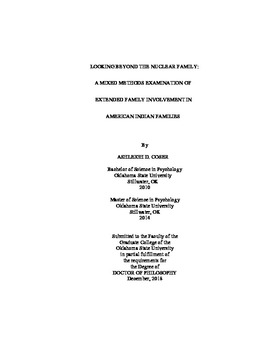| dc.contributor.advisor | Sullivan, Maureen A. | |
| dc.contributor.author | Coser, Ashleigh | |
| dc.date.accessioned | 2019-07-19T13:33:37Z | |
| dc.date.available | 2019-07-19T13:33:37Z | |
| dc.date.issued | 2018-12-01 | |
| dc.identifier.uri | https://hdl.handle.net/11244/320946 | |
| dc.description.abstract | A common practice among American Indian (AI) families, as well as many ethnic minority families, includes involving both nuclear and extended family members in raising children. This practice is believed to serve as a protective factor for families against negative outcomes and provide a potential avenue for social support. Several authors have described extended family members being involved in helping to raise, sharing cultural knowledge and customs, and disciplining youth. As a result, it has been proposed that extended family members help to nurture the parent-child relationship and provide various forms of support to parents. Despite this, the available research with AI families has been limited to specific examinations of their involvement such as the involvement of grandparents as custodial guardians or in providing kinship care. Given the various roles extended family members play in children's development, an examination of types of support and impact of support is warranted. The purpose of the current study is to examine how extended family members help support families. Specifically, the study will gain information from the perspectives of caregivers and extended family members on their specific roles in supporting parents and helping to raise children. A mixed-methods approach was used to explore extended family involvement from the perspectives of family members. Quantitative and qualitative data revealed a broad definition of family which included biological and non-biological family members who help to raise children. Several themes concerning extended family involvement emerged from interviews with caregivers and family members including teaching and reinforcing cultural knowledge and shaping children's behaviors, for example. Extended family members described their involvement as providing a new sense of purpose and helping to keep them active. Findings support and extend previous literature on the involvement of extended family by describing their role in the family and the impact of their involvement. Since the current project is an exploration of extended family involvement using a mixed-method approach, the study included a smaller sample size. Future studies may include a larger sample size and more diversity of study participants. Clinical implications include encouraging clinicians to consider engaging family members actively involved in raising children in helping to deter problematic behavior. | |
| dc.format | application/pdf | |
| dc.language | en_US | |
| dc.rights | Copyright is held by the author who has granted the Oklahoma State University Library the non-exclusive right to share this material in its institutional repository. Contact Digital Library Services at lib-dls@okstate.edu or 405-744-9161 for the permission policy on the use, reproduction or distribution of this material. | |
| dc.title | Looking Beyond the Nuclear Family: A Mixed Methods Examination of Extended Family Involvement in American Indian Families | |
| dc.contributor.committeeMember | Leffingwell, Thad Ryan | |
| dc.contributor.committeeMember | Chaney, John M. | |
| dc.contributor.committeeMember | Bailey, Lucy E. | |
| dc.contributor.committeeMember | Beasley, Lana | |
| osu.filename | Coser_okstate_0664D_15993.pdf | |
| osu.accesstype | Open Access | |
| dc.description.department | Psychology | |
| dc.type.genre | Dissertation | |
| dc.type.material | Text | |
